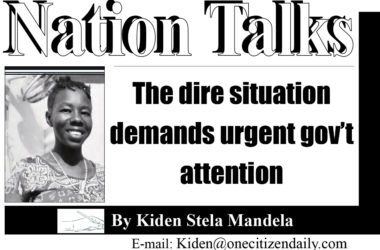Press release
Anticipating the rainy season that will worsen the living condition as well as increase the health needs, Médecins Sans Frontières (MSF) advocates for more support by the medical and humanitarian actors in Twic county of Warrap state in South Sudan.
“The situation is still very severe”, declares Beatriz Martinez de la Fuente, MSF project coordinator in Twic. “Because the conflict is still ongoing and considering that this area is likely to get flooded during the rainy season, this situation could become even more difficult for people here.”
“We continue to run our medical programmes, but there are acute needs for food, water supply, sanitation, shelter and protection, “she concludes.
About 10,000 internally displace people have settled in the Gomgoi camp after fleeing the city of Agok in February 2022, due to violence. In this region of Warrap State, which lacks food, water and healthcare services, and faces recurrent outbreaks of diseases, the displaced families are encountering a strained situation in Twic County. Moreover, the successive three years of flooding destroyed the crops and made it impossible to harvest more, creating a food shortage over the course of many long months. The displaced families have lived for over a year in makeshift camps made of wooden sticks, and pieces of fabrics or plastic sheeting.
Following the displaced population, MSF moved its activities from Agok—where the organisation had been running a hospital for eight years—to respond to the urgent needs of the newly displaced people in both side of Abyei Special Administrative Area and Warrap State. From March 2022, MSF teams started to offer humanitarian and medical assistance to displaced people within the Twic County. As well as running the mobile clinics, MSF distributed food, plastic sheeting, and other relief items and constructed latrines and water points in six of the seven makeshift camps.
Today, 30,000 persons are still living in dire conditions in the displaced camps, and the medical team witnesses the consequences of violence and displacement on the patients they treat.
Amou Lang Deng is the mother of Adhar Deng, a 16-month-old girl, who suffers from severe acute malnutrition. She was admitted to the MSF-supported clinic of Mayen-Abun for fever and diarrhea. The baby is anemic and needs regular blood transfusion while still being fed through a nasogastric tube. When violence erupted in Agok last year, Amou Lang Deng moved with her three young children and newborn baby to Abindau displaced camp, and still lives there with them.
“Life in the camp is very difficult as there is no food,” tells Amou Lang Deng. “There are some organisations, but there are delays between distributions, and the quantities are insufficient.”
From August 2022, MSF’s work shifted from an emergency response to a comprehensive and decentralized offer of medical care through the support of an 86-bed hospital in Mayen-Abun, two health posts in Gomgoi and Nyin Deng Ayuel, as well as in four community sites in the camps (Aweng, Majak Aher, Majok Noon and Abindau).
At the MSF-supported clinic in Mayen-Abun, MSF works hand in hand with the Ministry of Health to provide comprehensive care from outpatient consultations to emergency care and maternity, and hospital. A chronic care unit was also opened, as there are very few options for patients suffering from HIV or tuberculosis for instance. The MSF teams also offer psychological support to the individuals traumatised by violence and difficult life in the camps.
Since the start of the medical activities in Twic County, MSF teams have assisted 1300 deliveries, provided outpatient consultations to more than 162,000 patients and treated around 3700 patients in the emergency room. Furthermore, 1832 patients were given psychological support and around 460 were referred to other facilities for further specialised care.
“We receive many children with moderate or severe acute malnutrition,” explains James Tikuei Nyibango Okoth, MSF medical activity manager in Twic County. “They come mainly from the displaced camps, but also from the host community, because food is missing all over the region. Our teams are stretched to capacity, and the needs are immense.”
There are no surgical capacities in the whole Twic County, so they will be referred to Aweil, Northern Bahr el Ghazal State or to Wau in Western Bahr El Ghazal State. Road access is limited and long. The absence of an operation theatre puts many lives at risk.
“If a patient is bleeding, or a pregnant woman has an obstructed labour it is very difficult”, says James Tikuei Nyibango Okoth. “We have also lost patients on the way due to the long distance.”
In a hospital in Turalei, one-hour drive from Mayen-Abun in dry season, MSF is providing a one-time support to rehabilitate the Operating Theatre that is run by other humanitarian actors. Another challenge is the climate situation, as the recurrent flood that occurred in the region for three past years, not only make many areas inaccessible but also result in high peaks of waterborne diseases such as malaria.
While this region, along with other parts of South Sudan suffer from soaring needs, cuts to funding or reduced humanitarian assistance put lives of many in danger.



